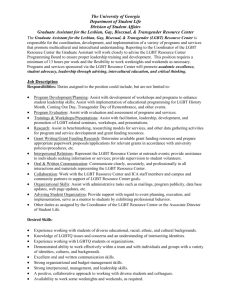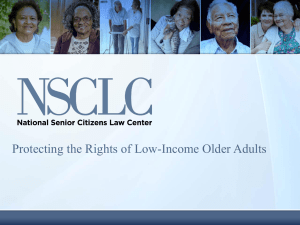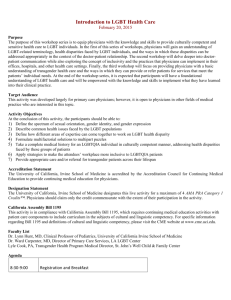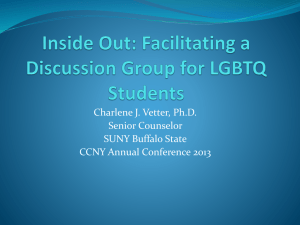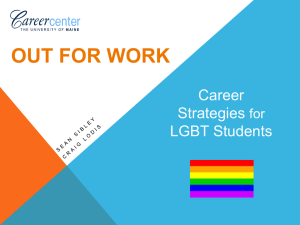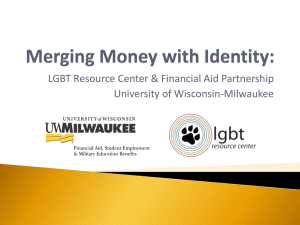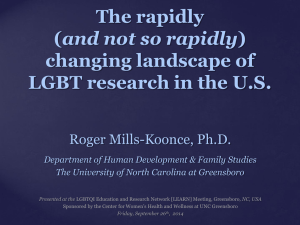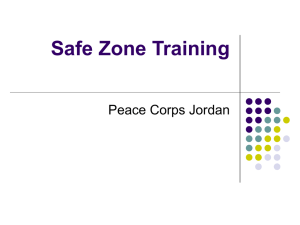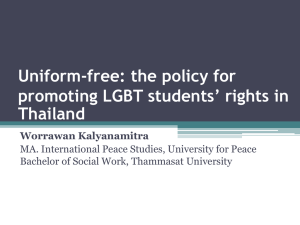LGBT Minds
advertisement
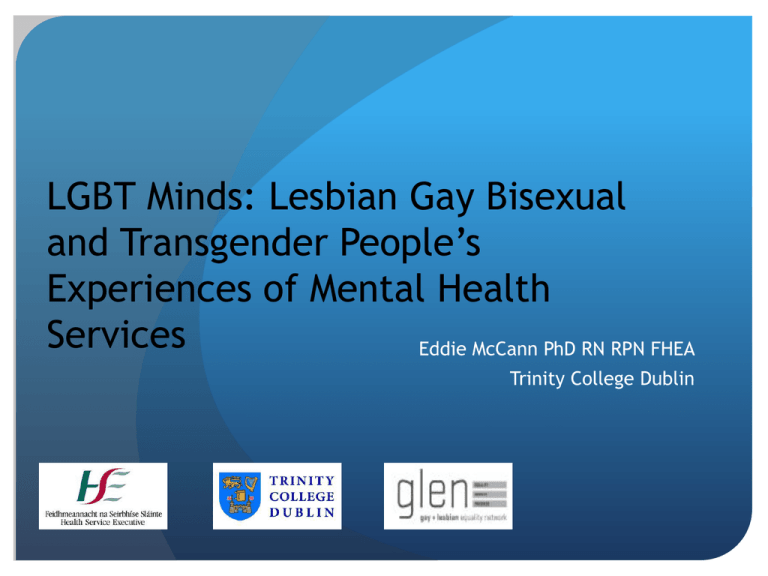
LGBT Minds: Lesbian Gay Bisexual and Transgender People’s Experiences of Mental Health Services Eddie McCann PhD RN RPN FHEA Trinity College Dublin Overview Stigma and discrimination Social exclusion (Vision for Change 2006) Psychological distress (King et al. 2008) Internalised self-hatred and shame (Cochran 2004) Mental health risk (Kuyper & Fokkema 2011) Study aim and objectives Aim: Explore LGBT people’s experiences of mental health service provision in the Republic of Ireland Objectives: Experiences of access Identify barriers and opportunities Identify good practices and service gaps Develop practice framework Study design Exploratory mixed methods Survey which could be completed electronically, by telephone or by post In-depth interviews with a sample of participants whom had completed the survey Inclusion criteria Over 18 LGBT Service use last 5 years Survey Advisory group input Existing tools e.g. Visible Lives 35 questions Demographics Sexual orientation and gender identity Mental health status Mental health service use Service Experiences 2 open ended questions (suggestions for improving services and further comments) Recruitment and data collection Survey pilot (n=5) Invisibility and hard to reach On-line, post, telephone Website: www.lgbtminds.ie LGBT and mental health ) organisations (n=170)(information and posters), press Ethics and protection TCD approval granted LGBT guidelines (Kandirikirira 2004) Anonymity Signed consent Support Data storage Profiles N (%) Age range 18-64 125 (100) Cultural background White Irish White Non-Irish Asian Other 104 (84) 16 (12) 2 (2) 2 (2) Area living Urban Rural 89 (72) 34 (28) Gender identity Male Female Transgender Other 46 (37) 68 (55) 3 (2) 7 (6) Sexual orientation Gay Lesbian Bisexual Heterosexual Other 52 (42) 41 (33) 19 (15) 1 (1) 12 (10) Diagnosis (n=97) % Depression 74 Anxiety 51 Sleep disorder 22 Eating disorder 18 Gender identity disorder 10 Post traumatic stress disorder 9 Bipolar disorder 8 Obsessive compulsive disorder 8 Personality disorder 8 Substance-related issues 5 Schizophrenia 3 Other 8 Services used Out patient clinic (n=83) Psychiatric Hospital (n=27) Day hospital (n=18) Day centres (n=16) Survey-service experiences 1 Could not discuss LGBT identity (33%) Professionals should know identity (65%) Feared negative reaction (16%) Feel professionals lack LGBT knowledge (64%) Not sensitive to LGBT issues (37%) Seek out LGBT friendly services (42%) Partners not acknowledged (40%) Survey-service experiences 2 Non-inclusive language use by staff (40%) Disclosure and negative reaction (30%) Helped improve mental health (80%) Engagement and staff attitudes Ensure an atmosphere of comfort and acceptance to encourage LGBT people to be completely honest and treat people with dignity and respect. Having been in an abusive lesbian relationship I received very little sympathy from some psychiatrists I have seen and it has even been suggested to me that my life will stabilize when I find a man. LGBT identities I've noticed the term 'Borderline Personality Disorder' being applied far to readily to anyone who identifies as LGBT, thus dismissing the validity of the person’s sexual orientation While mental health professionals were usually willing to read up on issues related to trans* people, and many were willing to learn, there was little understanding of: -The way many different aspects of one's identity can overlap to cause stress related to social oppression. Partner and carer supports My partner is trans. I feel this is an incredibly underserved group, both trans people and their partners, and I find it difficult to have my experiences understood by mental health practitioners across the board when it comes to this issue specifically. Treatment options I wasn't comfortable coming out to my mental health provider (psychiatrist) and did not feel they would be sensitive or even try to help me with any LGBT issues. They were not willing to help (apart from medications) with any other mental health issues I was experiencing. This is very different to some to my experiences I had in the UK, where I did get access to CBT, counselling, psychotherapy, mindfulness etc. and was able to feel comfortable addressing LGBT issues - and all free of charge. +ve service experiences I am currently an outpatient attending a day hospital for 14 months. As an LGBT person I felt respected and at ease with the staff I encountered. When I mentioned in passing that I was a lesbian I was asked to share my coming out experiences etc and received good feedback from my counsellors and psychiatrist and was offered leaflets/advice etc. I must admit I was kind of amazed but pleasantly surprised. -ve experiences Area psychiatrists are paid by the HSE. Some refuse to deal with transgender patients. These people should either be trained in trans issues or stop ignoring those who need their help. Health system in Ireland is archaic and severely under-funded. I cannot get access to a qualified therapist to support me with ongoing issues as a result of a history of child sexual abuse. Mental health services in Ireland are awful in general not just with LGBT. I was put on anti-depressants at the age of 15 by my G.P when I told her I was feeling down due to my parents splitting up. I didn't see any mental health professional until the age of 18. And then only saw her twice. Very little came of 20 minutes talking. Increasing awareness of LGBT issues Continue to destigmatise mental health; educate our society (at secondary level, 3rd level and society in general) more on mental health; get people talking about it. More programmes on TV Educate staff and providers on Trans issues and the diversity of transgender experience in particular. Main concerns 1 Mental health professionals not adequately trained or educated in LGBT issues – gender sensitivity LGBT identity an important part of who the person is, not considered relevant or important Fear of coming out to mental health professionals Lack of trust in health professionals Assumptions made by health professionals re sexuality Intense fear of institutionalisation – equated with total loss of control Main Concerns 2 Trans community in need of support No integration of services Accessing services Overreliance on pharmaceuticals Isolation, stigma Advisory group: Danika Sharek Odhran Allen Patrick Callaghan Agnes Higgins Thank you mccanned@tcd.ie

